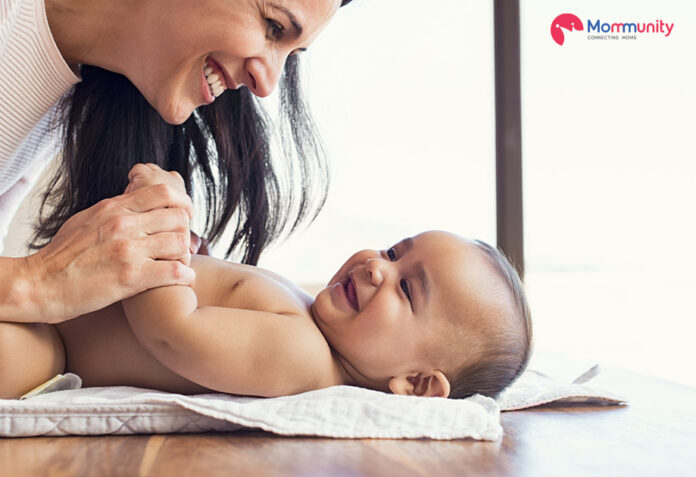Want to hear the voice of your little one? When do they start to say mumma or dad? Wondering about when do babies learn to talk? Talk with your baby is a marvelous journey for any parent. The process includes various stages, each marked by milestones that indicate your child’s developing communication skills.
Let’s understand the various stages and go through the process. This blog helps you know more about when do babies learn to talk providing insights and tips to support your baby’s language development.
The First Sounds: Birth to 3 Months
From the moment they are born, babies start to develop the foundation for speech. During the first three months, their way of communicating is crying. Each cry tells a different purpose, signaling hunger, discomfort, or the need for sleep. These early sounds are crucial as they help babies exercise their vocal cords and begin to understand the basics of communication.
Around the 2-month-old age, babies start to make cooing sounds, which are soft and vowel-like. This stage is a sign that they are beginning to experiment with their vocal capabilities.
Babbling Begins: 4 to 6 Months
At the age of between 4 to 6 months, babies enter the babbling stage. They start to produce consonant sounds like “baba” or “dada.” This period is exciting because it marks the beginning of more structured vocalizations. Babbling is not just random noise. It’s a critical step in the development of speech patterns.
At this stage, babies may also start to recognize familiar voices and sounds. They are capable of turning their head toward a sound or showing excitement when they hear a familiar voice. This responsiveness is a positive indicator of their growing ability to understand their environment.
The Emergence of First Words: 7 to 12 Months
From 7 to 12 months, babies mostly begin to say their first words. These are usually simple words like “mama” or “dada,” which are often easier to pronounce. The first words are an exciting milestone for parents and are a clear indication that their baby is starting to use language meaningfully.
During this period, babies also begin to understand simple instructions and can respond to their names. They may also start gestures like pointing or waving to communicate their needs and interests. Cheer up these gestures can further support their language development.
Expanding Vocabulary: 13 to 18 Months
At the age of 13 to 18 months, babies’ vocabulary starts to expand rapidly. They may learn new words every week. They start framing simple little sentences, such as “more milk” or “bye-bye Daddy.” This stage is marked by a growing understanding of language and its use for communication.
Parents can support this growth by reading to their babies, engaging in conversations, and naming objects during daily activities. These interactions provide rich language exposure and help support the words babies are learning.
Forming Sentences: 19 to 24 Months
On their second birthday, they start to form more complex sentences. They may begin to use two to three-word combinations like “big truck” or “want cookie.” Their ability to understand and follow simple instructions also improves, showing a deeper grasp of language.
During this period, it’s important to continue talking to your child, asking questions, and encouraging them to express themselves. This interactive communication helps solidify their understanding and use of language.
Beyond Two Years: Continued Language Development
After the age of two, children’s language skills continue to develop at a rapid pace. They start to use more complex sentences, ask questions, and engage in conversations. Their vocabulary grows significantly, and they become more adept at expressing their thoughts and feelings.
By age three, many children can hold conversations, understand simple stories, and follow multi-step instructions. This stage is a testament to the rapid and remarkable development of their language skills.
Tips to Support Your Baby’s Language Development
-
Talk Regularly
Engage in frequent conversations with your baby. Describe your actions, name objects, and talk about your surroundings.
-
Read Together
Reading to your baby introduces them to new words and sentence structures. Choose age-appropriate books with colorful pictures and simple stories.
-
Respond to Babbling
Motivate your baby’s babbling by responding and mimicking their sounds. This interaction reinforces their efforts and promotes more vocalization.
-
Sing Songs
Singing nursery rhymes and songs helps babies recognize rhythm and patterns in language.
-
Use Gestures
Combine words with gestures to help your baby understand the meaning of words. For example, wave while saying “bye-bye.”
-
Play Games
Simple games like peek-a-boo or pat-a-cake involve repetitive language and help babies learn through fun interactions.
The Final Note
In the end, understanding when do babies learn to talk involves recognizing and supporting various developmental stages. From the first coos to forming complete sentences, each step is an essential part of their language journey.
By engaging in conversations, reading, and playing with your baby, you can foster a rich language environment that encourages their communication skills to flourish. Stay patient and attentive, and celebrate each milestone as your baby progresses in their language development journey.




